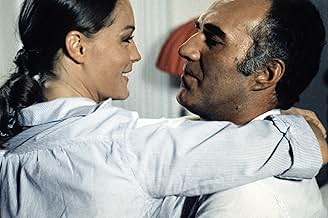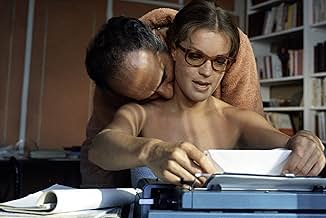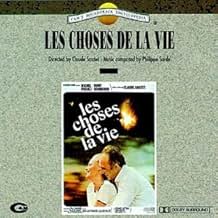VALUTAZIONE IMDb
7,4/10
5995
LA TUA VALUTAZIONE
Un ingegnere autostradale è coinvolto in un incidente stradale, dopodiché, vicino alla morte, ricorda la sua vita precedente all'incidente.Un ingegnere autostradale è coinvolto in un incidente stradale, dopodiché, vicino alla morte, ricorda la sua vita precedente all'incidente.Un ingegnere autostradale è coinvolto in un incidente stradale, dopodiché, vicino alla morte, ricorda la sua vita precedente all'incidente.
- Regia
- Sceneggiatura
- Star
- Premi
- 1 vittoria e 2 candidature totali
Recensioni in evidenza
By watching this 1969 movie, I have just confirmed my opinion about Claude Sautet: that's one Director that takes the expectator "inside the scene" (As seen in his latest work: Nelly and Mr.Arnaud). He has this ability that allows him to "extract" the most of his characters in the psychologic aspect, by showing all the range of their feelings...Take the scene where Pierre Berard (portrayed by Michel Piccoli) tells Héléne (played by Romy Schneider) of his sudden decision of no longer accompany her on a trip planned ages ago. Another scene that worths appears in a record as a "Death Scenes Hall of Fame" is the one in which Pierre lays on the grass, his thoughs exposed as the expectator follows him, in all his emotional suffering. Claude Sautet: a Director that deserves having his name written in the "Hall of Fame of the Greatest Directors of All Times". As an "homage" to him, in a scale of 10, I grade this film 9.
With "les choses de la vie" ,Claude Sautet relinquished his former style ,film noir ("classes tous risques" "l'arme à gauche" both worth seeking)in favor of bourgeois psychological dramas .
"Les choses de la vie" was the first link on the chain,and -with the exception of "Max et les ferrailleurs" (1971),which showed Sautet at the height of his powers,when he came back for a short while to his first inspiration-remains the best of this "cinema de qualité".
Unlike the other works ("Mado" "Cesar et Rosalie" "Vincent,François,Paul et les autres" "une histoire simple" ,etc etc etc) ,"les choses de la vie" has an emotional power and an unusual inventive direction.Editing is stunning (the first picture is one wheel of the car ),and never a car accident was filmed with such mastery.Flashbacks are used with great skill too.The nightmare scene (the wedding) remains very impressive today.And the metaphorical way Sautet uses to depict the hero's death commands respect and admiration.The last part of the movie is almost completely silent,but the strength of the pictures and the actors' talent (Piccoli,Schneider,but Lea Massari and Jean Bouise too)work wonders.Superb score.louis Delluc prize.
Remake :"intersection" featuring Richard Gere.As I cannot say something nice...
"Les choses de la vie" was the first link on the chain,and -with the exception of "Max et les ferrailleurs" (1971),which showed Sautet at the height of his powers,when he came back for a short while to his first inspiration-remains the best of this "cinema de qualité".
Unlike the other works ("Mado" "Cesar et Rosalie" "Vincent,François,Paul et les autres" "une histoire simple" ,etc etc etc) ,"les choses de la vie" has an emotional power and an unusual inventive direction.Editing is stunning (the first picture is one wheel of the car ),and never a car accident was filmed with such mastery.Flashbacks are used with great skill too.The nightmare scene (the wedding) remains very impressive today.And the metaphorical way Sautet uses to depict the hero's death commands respect and admiration.The last part of the movie is almost completely silent,but the strength of the pictures and the actors' talent (Piccoli,Schneider,but Lea Massari and Jean Bouise too)work wonders.Superb score.louis Delluc prize.
Remake :"intersection" featuring Richard Gere.As I cannot say something nice...
"Les choses de la vie" is the ultimate "mid life crises" movie. A middle aged man must (but can not) choose between his younger girl friend on the one hand and his ex wife and son on the other hand. As a result he gets irritated and frustrated. He smokes heavily and drives aggressively.
Michel Piccoli wonderfully impersonates this character (Pierre Berard). It was a good choice of television channel "Arte" to select this film in memory of Michel Piccoli, who died in may 2020 at the age of 94.
"Les choses de la vie" also was the film in which director Claude Sautet changed from "crime" to "drama", and especially the drama of the middle class. He so became a sort of French Ozu. But where the middle aged Japanese man above all is interested in the marriages of his daughters (or the lack thereoff), the European middle aged man tries to prove that he is still capable by taking a younger mistress.
Sautet tells the story in a peculiar chronological order. Center piece in the movie is a car accident with Pierre as its victim (after all he was driving aggressively). Just like a stone thrown in the water gives wrinklings moving in ever wider circles, the injured Pierre has memories that go further and further back in time. At the end there is no clear distinction anymore between memories and dreams.
Michel Piccoli wonderfully impersonates this character (Pierre Berard). It was a good choice of television channel "Arte" to select this film in memory of Michel Piccoli, who died in may 2020 at the age of 94.
"Les choses de la vie" also was the film in which director Claude Sautet changed from "crime" to "drama", and especially the drama of the middle class. He so became a sort of French Ozu. But where the middle aged Japanese man above all is interested in the marriages of his daughters (or the lack thereoff), the European middle aged man tries to prove that he is still capable by taking a younger mistress.
Sautet tells the story in a peculiar chronological order. Center piece in the movie is a car accident with Pierre as its victim (after all he was driving aggressively). Just like a stone thrown in the water gives wrinklings moving in ever wider circles, the injured Pierre has memories that go further and further back in time. At the end there is no clear distinction anymore between memories and dreams.
Pierre Bérard is a man in his forties, a lean and attractively masculine architect exuding self-confidence and that nuanced shade of charisma in gray-flannel suits executive display like a second nature.
On a sunny day in the French countryside near Nantes, a lorry full of pigs is caught in the middle of an intersection; blocking the way to Pierre's car coming at full speed, and with a truck coming in the opposite direction, Pierre can't avoid the head to tail, he veers off the road, hits a tree, spins and turns over and over before being ejected on the grass. The accident lasts less than ten seconds but is treated like a longer interval allowing Pierre to recall all the events that preceded it... and also to tell us that real people don't 'go out' with style and only Sautet's artistic license made a truly engaging character out of a rather ordinary man.
Now, there's more than the "whole-life-flashes-before-eyes" trope, more than the brutality of a sudden accient that the magic of cinema can stretch to a long exhausting hour, itself being the result of ten days of shooting, there's more to it. There's a stylistic decision from Claude Sautet that marks one single event with the stamp of human obsession: like the Golden Palm winner of 1966, "Blow-up" and a mysterious picture or the winner of 1974 "The Conversation" with a mysterious recording, the adaptation of Paul Guimard's novel explores an 'act of God' with the hopeless insistence suggesting that something ever went wrong.
The title gives the unique clue, that's only part of the "things of life".
The film opens with an unscrewed wheel rolling like the last remain of a life in motion. Pierre is lying motionless on the grass, his car already burnt up. Cut to Pierre, lying in bed, with Hélène (Romy Schneider), so much younger we suspect she's not the woman with the ring. There's something about Michel Picolli's physique that makes him strangely more appealing than matinee idol Delon, whose movies with Schneider feel designed to attracts younger audiences. Picolli with his receding hairline, his silvery sideburns, his hairy chest and his naturalness makes the relationship somewhat more relatable.
The intentionally unsubtle transition to the first flashback exposes a naked truth about Pierre's life. The whole accident is shown in slow-motion and intercut with events and incidents set before, getting us close enough to his state of mind during the brief lapse of his accident to seize the irony of his whole life: only when he regained control that he was caught off-guard. In the slow-motion parts, you can see in his face a grim look either out of anticipation of pain, or worse, the realization that he had just broken his "Pot of Milk" like La Fontaine's dairymaid.
Picolli dominates the screen, his chemistry with Helene is believable but there's something so 'definite' about their project to leave for Tunis that it doesn't fool us about Pierre's motivation. He's got a life besides Hélène: a job, a friend (Jean Bouise), a gifted son (Gérard Lartigau) who manufactures electronics gadgets and his ex-wife Catherine (Lea Massari). Every ordinary moment has a sort of casual nonchalance, not interesting in the cinematic meaning, the expositional value would even compromise our interest if it wasn't for Piccoli floating above his own arc with a thinly veiled duplicity.
When he takes an old childhood picture from an old relative or when he has an intimate conversation with ex-wife he grows some complicity, it's like the unexpected activation of the subconscious before something dramatic would happen. And so the flashbacks all build up to the moment where he cancels his holidays with Helene, to spend more time with son. He's evasive in his explanations, with the guilt-ridden expression of a man who can't make the fatal move, I could relate to it. The middle-act weakens the characters but humanizes him in the process.
His chain-smoking isn't even a detail, he smokes so much that IMDb's cigarette count on the Trivia page made me laugh (46, by the way). It's not much the addiction but rather the necessity to plug himself to old habits, the unmovable forces that govern his life without hurting anyone but him.
Another scene shows his first encounter with Helene during an auction, outbidding her for such a futile piece of art it leaves no doubt about her status as the trophy girl. Helene becomes the lighthouse illuminating his second youth, shown through romantic outdoors interludes à la "Love Story", all converging toward the tragic intersection and its nihilistic taste bacK.
Life is a series of random events that constitute our arc, the events that prompted Pierre to write a letter, to retract himself for sending it, to make the final choice, Pierre talking to himself and letting the viewers know the contents of his thoughts, all these things don't amount to much when destiny decides to cut short all our goals and projects.
When Pierre is lying on the ground like Rimbaud's "Sleeper of the Valley", his thoughts are internalized, passing the torch to the more traditional voice-over (that might have inspired the final monologue in "Carlito's Way"). Images aren't set in the past but in a future too idealized to be taken at face value. Indeed, when Pierre's imagination starts, his reality is fading out slowly, becoming the subject of morbid curiosity. The show of life goes on with the anticlimactic spectacle of normality: angry drivers, quarreling couples, policemen, doctors, hospitals and all that jazz.
We're never in total control of our lives, and as one of my friends used to tell me, we spend our life writing the past, not the future, or like John Lennon said, "life is what happens while you're busy making plans" or as LaFontaine said:
When I'm alone, I dare the utmost: [...] Diadems rain down on me.
Some chance event then brings me to my senses, And I'm my lowly self again.
On a sunny day in the French countryside near Nantes, a lorry full of pigs is caught in the middle of an intersection; blocking the way to Pierre's car coming at full speed, and with a truck coming in the opposite direction, Pierre can't avoid the head to tail, he veers off the road, hits a tree, spins and turns over and over before being ejected on the grass. The accident lasts less than ten seconds but is treated like a longer interval allowing Pierre to recall all the events that preceded it... and also to tell us that real people don't 'go out' with style and only Sautet's artistic license made a truly engaging character out of a rather ordinary man.
Now, there's more than the "whole-life-flashes-before-eyes" trope, more than the brutality of a sudden accient that the magic of cinema can stretch to a long exhausting hour, itself being the result of ten days of shooting, there's more to it. There's a stylistic decision from Claude Sautet that marks one single event with the stamp of human obsession: like the Golden Palm winner of 1966, "Blow-up" and a mysterious picture or the winner of 1974 "The Conversation" with a mysterious recording, the adaptation of Paul Guimard's novel explores an 'act of God' with the hopeless insistence suggesting that something ever went wrong.
The title gives the unique clue, that's only part of the "things of life".
The film opens with an unscrewed wheel rolling like the last remain of a life in motion. Pierre is lying motionless on the grass, his car already burnt up. Cut to Pierre, lying in bed, with Hélène (Romy Schneider), so much younger we suspect she's not the woman with the ring. There's something about Michel Picolli's physique that makes him strangely more appealing than matinee idol Delon, whose movies with Schneider feel designed to attracts younger audiences. Picolli with his receding hairline, his silvery sideburns, his hairy chest and his naturalness makes the relationship somewhat more relatable.
The intentionally unsubtle transition to the first flashback exposes a naked truth about Pierre's life. The whole accident is shown in slow-motion and intercut with events and incidents set before, getting us close enough to his state of mind during the brief lapse of his accident to seize the irony of his whole life: only when he regained control that he was caught off-guard. In the slow-motion parts, you can see in his face a grim look either out of anticipation of pain, or worse, the realization that he had just broken his "Pot of Milk" like La Fontaine's dairymaid.
Picolli dominates the screen, his chemistry with Helene is believable but there's something so 'definite' about their project to leave for Tunis that it doesn't fool us about Pierre's motivation. He's got a life besides Hélène: a job, a friend (Jean Bouise), a gifted son (Gérard Lartigau) who manufactures electronics gadgets and his ex-wife Catherine (Lea Massari). Every ordinary moment has a sort of casual nonchalance, not interesting in the cinematic meaning, the expositional value would even compromise our interest if it wasn't for Piccoli floating above his own arc with a thinly veiled duplicity.
When he takes an old childhood picture from an old relative or when he has an intimate conversation with ex-wife he grows some complicity, it's like the unexpected activation of the subconscious before something dramatic would happen. And so the flashbacks all build up to the moment where he cancels his holidays with Helene, to spend more time with son. He's evasive in his explanations, with the guilt-ridden expression of a man who can't make the fatal move, I could relate to it. The middle-act weakens the characters but humanizes him in the process.
His chain-smoking isn't even a detail, he smokes so much that IMDb's cigarette count on the Trivia page made me laugh (46, by the way). It's not much the addiction but rather the necessity to plug himself to old habits, the unmovable forces that govern his life without hurting anyone but him.
Another scene shows his first encounter with Helene during an auction, outbidding her for such a futile piece of art it leaves no doubt about her status as the trophy girl. Helene becomes the lighthouse illuminating his second youth, shown through romantic outdoors interludes à la "Love Story", all converging toward the tragic intersection and its nihilistic taste bacK.
Life is a series of random events that constitute our arc, the events that prompted Pierre to write a letter, to retract himself for sending it, to make the final choice, Pierre talking to himself and letting the viewers know the contents of his thoughts, all these things don't amount to much when destiny decides to cut short all our goals and projects.
When Pierre is lying on the ground like Rimbaud's "Sleeper of the Valley", his thoughts are internalized, passing the torch to the more traditional voice-over (that might have inspired the final monologue in "Carlito's Way"). Images aren't set in the past but in a future too idealized to be taken at face value. Indeed, when Pierre's imagination starts, his reality is fading out slowly, becoming the subject of morbid curiosity. The show of life goes on with the anticlimactic spectacle of normality: angry drivers, quarreling couples, policemen, doctors, hospitals and all that jazz.
We're never in total control of our lives, and as one of my friends used to tell me, we spend our life writing the past, not the future, or like John Lennon said, "life is what happens while you're busy making plans" or as LaFontaine said:
When I'm alone, I dare the utmost: [...] Diadems rain down on me.
Some chance event then brings me to my senses, And I'm my lowly self again.
French films are famous for their depiction of minor incidents which converge at a larger point to make up the most of what happens in the lives of people. This helps viewers to have a better idea of protagonists' lives. French director Claude Sautet chose to base his film on this premise as he films the personal as well as professional lives of a successful yet unhappy man. From a career point of view, actor Michel Piccoli is shown as somebody doing well in life as he is appreciated by everybody around him. However, his personal life is in turmoil as he is unable to decide between his wife and his mistress. As he is about to solve this dilemma, a tragedy unfolds in his life. This is hardly the description of an original story but what makes the film interesting is how it has been shot. Apart from describing in detail minor incidents related to the lives of protagonists, Claude Sautet has used all his imagination to film the accident scene which occupies a large part of this film's screen space. Finally, once the film is over, some viewers might be tempted to call it the most important moment of the film.
Lo sapevi?
- QuizCigarette count: 46
- BlooperIn the car crash scene, the stunt double for Michel Piccoli is seen wearing brown gloves in close-ups. However Piccoli is bare-handed while driving.
- ConnessioniFeatured in Claude Sautet ou La magie invisible (2003)
I più visti
Accedi per valutare e creare un elenco di titoli salvati per ottenere consigli personalizzati
- How long is The Things of Life?Powered by Alexa
Dettagli
Botteghino
- Lordo Stati Uniti e Canada
- 5063 USD
- Lordo in tutto il mondo
- 5063 USD
- Tempo di esecuzione1 ora 29 minuti
- Mix di suoni
- Proporzioni
- 1.66 : 1
Contribuisci a questa pagina
Suggerisci una modifica o aggiungi i contenuti mancanti





























